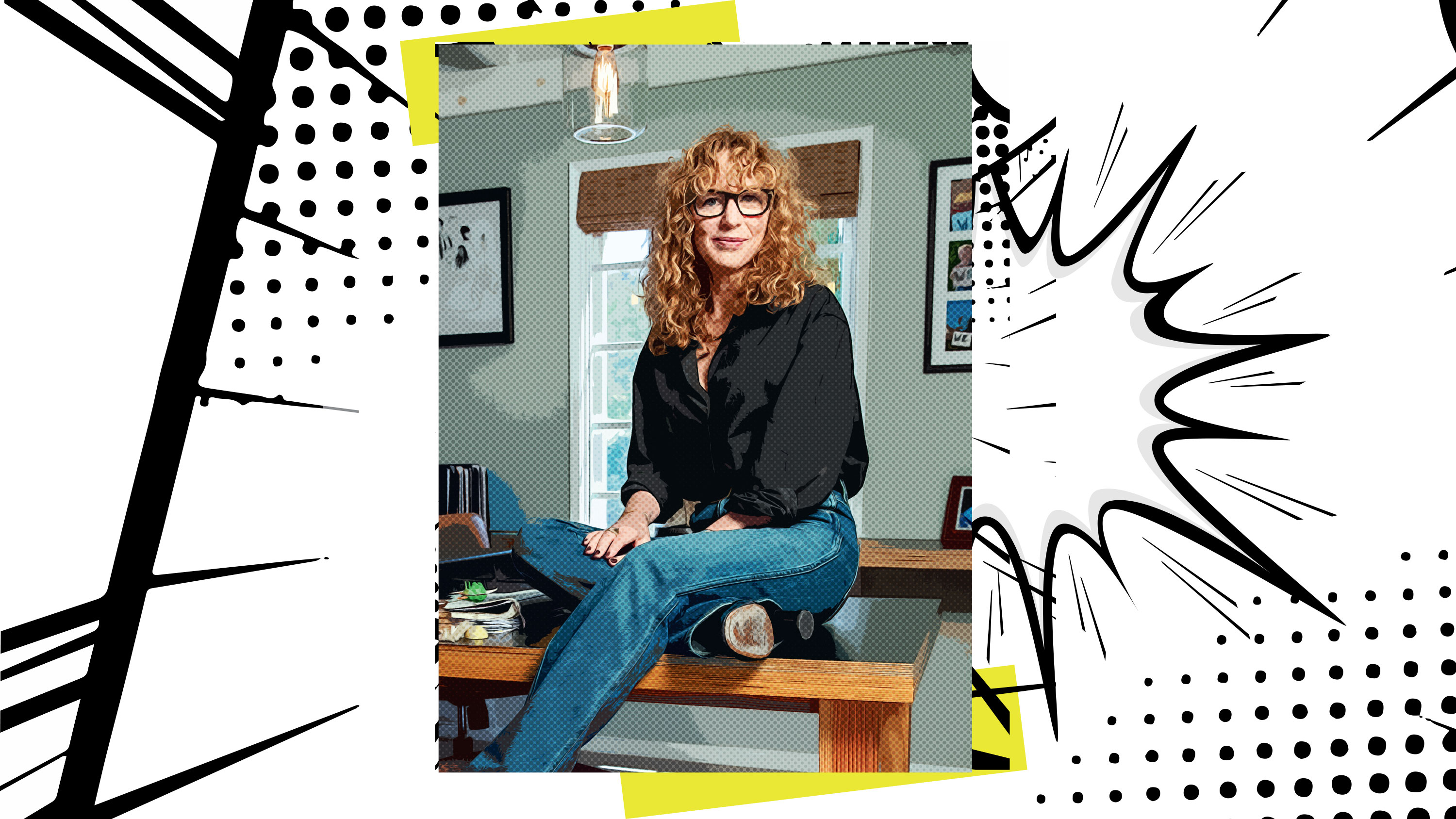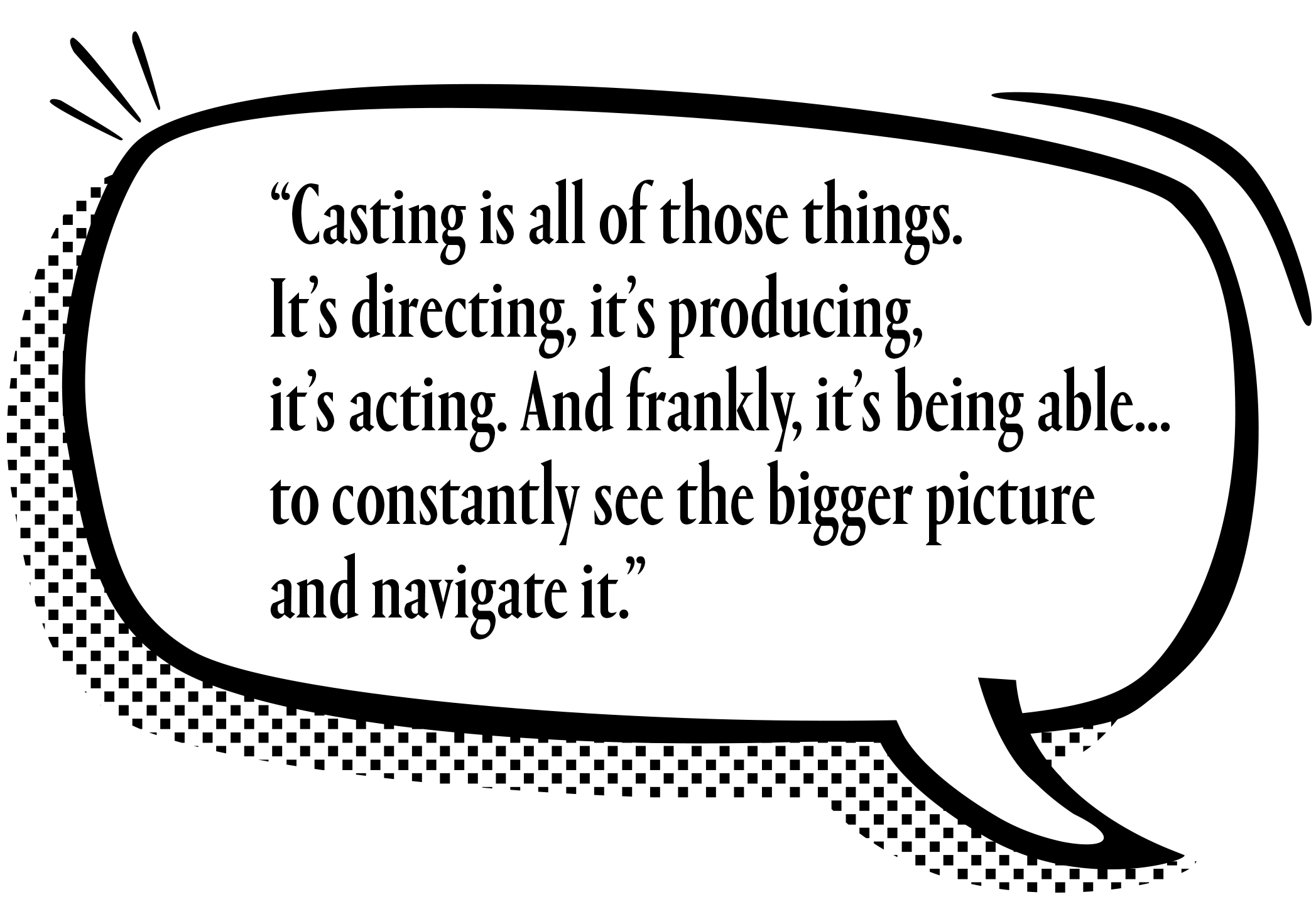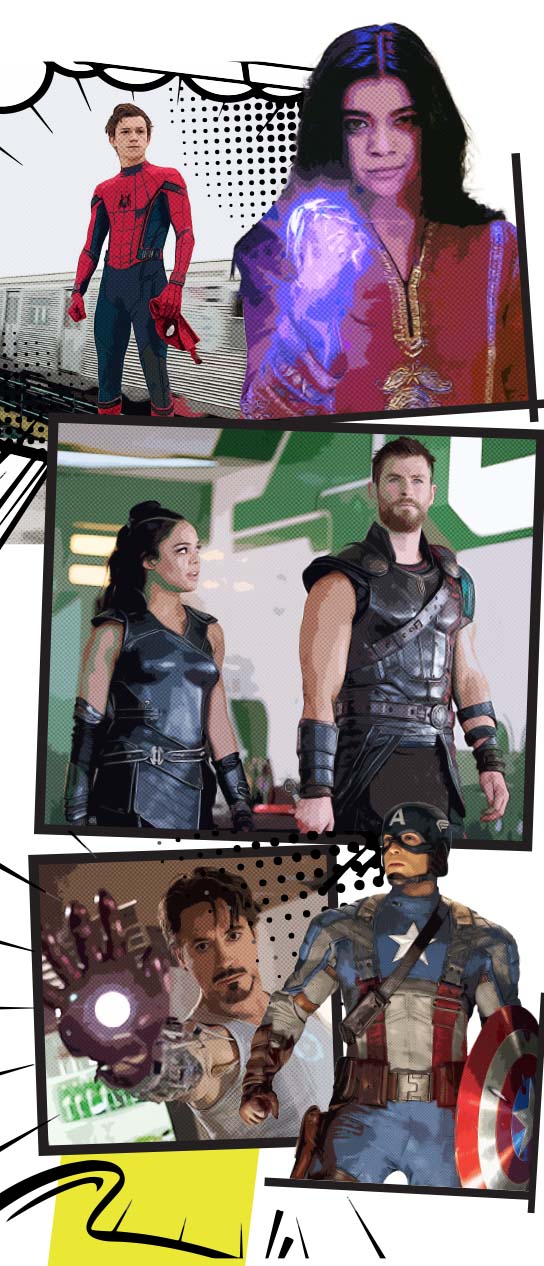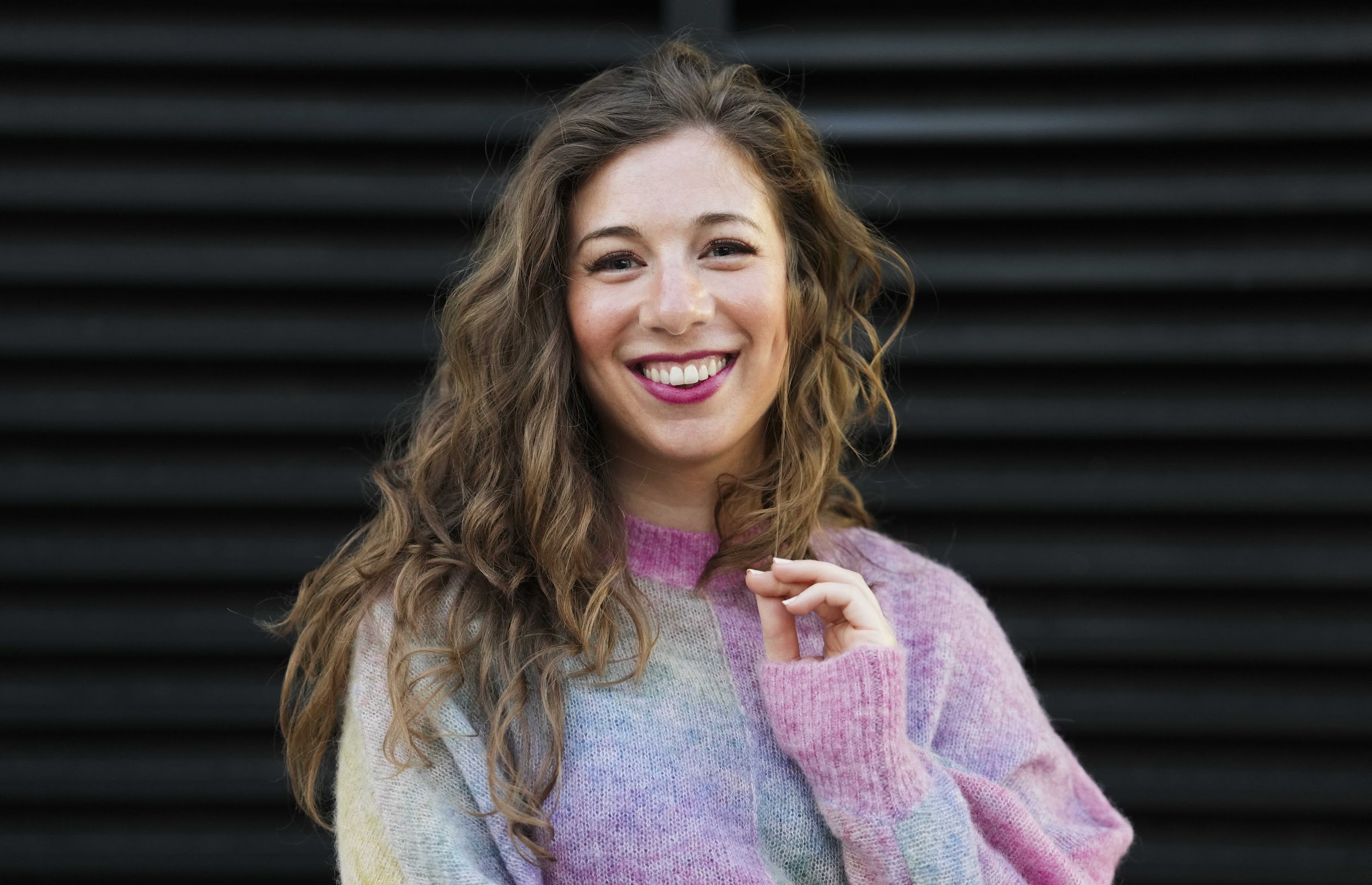Holding Out for a Hero
Sarah Finn, the casting director behind the Marvel Cinematic Universe, is probably, as you read this, plucking the next Chris from obscurity, setting him on a path to superhero superstardom. How did a sensitive theater geek become a real-life Avengers assembler?


Marko Macpherson (Photography)
You’re not supposed to cry at work. Sarah Finn knows this. But when the casting director can tell she’s found the right actor for a role, “It’s like this electrical current that starts running through the room,” she says. “It feels like something is taking flight.” She gets butterflies in her stomach and tears in her eyes. “It’s very emotional for me.”
Finn used to feel self-conscious about crying during the casting process. “I do think that culturally, as women, we go into the workplace and we think we can’t be wildly emotional. We can’t operate that way. No one is going to trust this budget of a movie to me, and all of this responsibility, if I’m crying all the time. But I don’t think that I would be any good at my job if I didn’t care so much and didn’t feel things so emotionally. So I’ve learned along the way to trust that.”
Finn isn’t exaggerating about responsibility—or really big budgets. In 2006, Marvel Studios president Kevin Feige tapped Finn to lead the search for Tony Stark, the irreverent billionaire-genius who would kick off the Marvel Cinematic Universe (MCU). Selecting Robert Downey, Jr. for the role was a gamble for both franchise and actor: Downey, who wasn’t known as an action star, was willing to screen-test for Marvel, which was then an unknown quantity with no track record to speak of. The resulting Iron Man set in motion one of, if not the largest, most profitable movie-making machines in the history of the medium. Finn has cast every MCU production since: 36 movies and 16 shows, save for 2008’s oft-forgotten Incredible Hulk. (The lead, Edward Norton, was later replaced—by Finn— with Mark Ruffalo.)
She’s one of the only constants across the vast, ever-expanding Marvel Cinematic Universe. For more than 15 years, Finn’s tastes have shaped the movies and television shows that, to the ecstasy of some and the agony of others, dominate the entertainment industry and occupy an outsize place in our cultural imaginations, signaling to untold millions what strength, beauty, villainy, and goodness look like.
Like Miranda Priestly pulling unseen strings to dictate what trends the world will wear next season, Finn determines who the next celebrity crush will be; whose face will grace a new generation’s backpacks and lunchboxes; who will find themselves catapulted from, say, an Australian soap opera (Chris Hemsworth) or London’s West End (Tom Hiddleston) into a stratosphere of fame beyond what most humans can fathom. She is the one who saw, for instance, in Chadwick Boseman’s audition for Drax the Destroyer, a regal quality that made him all wrong for Guardians of the Galaxy but put him at the top of her list for Black Panther; who thought beyond the white, blonde comic-book origins of Valkyrie and envisioned Tessa Thompson in Thor: Ragnarok.
Finn selected Tom Holland from more than 7,500 bendy brunettes, putting the then practically unknown actor into Spider-Man’s spandex and at the front of one of the highest-grossing movies of all time.
It can take weeks or months or more of exhausting, all-consuming work for Finn—of global searches and self-tapes and in-person auditions and camera tests and chemistry reads—to get to that moment of finding The One. She jokes that it always takes as much time as she has.
Get exclusive access to fashion and beauty trends, hot-off-the-press celebrity news, and more.
Before Jac Schaeffer, creator of WandaVision, met Finn, “The people I was working with called her ‘SarahFinnCo.’” Schaeffer jokes that she was confused at first (“Her name is Sarah Finn, right?”) but thinks the moniker is perfect. “It’s so fitting because she is an institution.”
“She has such incredible instincts,” Schaeffer continues, and always pushes for “the freshest take on the character. Often as a writer, you’re thinking about performers who’ve already played a version of that role. Sarah is really great at internalizing the writer’s intention and then finding a new flavor for that: something that’s unexpected for the audience and will feel special or unique.”
For experienced actors under consideration, Finn’s all-female, 13-person team puts together tapes to showcase a side of that performer the director may not be familiar with. This was how Finn sold everyone on Chris Evans, who’d initially been dismissed in Captain America conversations for having already been in a (pre-MCU-official) Fantastic Four that critics hated. Finn found footage from Evans’s performance in a Tennessee Williams adaptation to prove he could pull off the retro style required to play mid-century man Steve Rogers.

One of Finn’s gifts is sensing in actors the qualities they may not see in themselves: She picked up on a darkness in Sebastian Stan, who first read for Captain America, that told her he’d be a better Bucky; she saw a “playful yet subtly menacing” energy in Hiddleston, then going up for Thor, that made her think, Boy, is he Loki.
“She has such an incredible eye for potential,” says Schaeffer. Finn can see a read and look beyond whether or not it was perfect and delve instead into the actors’ choices and intentions. “It’s like she’s got X-ray vision. She can tell you what you can expect from performers.”
Often Finn is searching for a total unknown, which is “terrifying and exhilarating.” (The fact that so many Marvel characters will be played by a not-yet-famous person is one of the reasons Finn can’t take your fan castings too seriously—though she swears she’s paying attention, and that, every now and then, she’ll give the people what they want. That’s how John Krasinski popped up as Reed Richards in this year’s Doctor Strange in the Multiverse of Madness. “We all just thought, Let’s lean into this.”)
In casting Kamala Khan, the adolescent lead of the Disney+ show Ms. Marvel, Finn needed to find a Pakistani-Muslim teenager. For the first time in all her MCU years, Finn had to put out fliers in schools and restaurants. When Iman Vellani, who ultimately landed the part, heard about the audition, it was through a chain so random—someone her aunt knew saw something on WhatsApp—that she assumed it was a hoax.
The now-20-year-old Canadian’s acting experience consisted of high school theater. “I honestly think [Finn] took a risk hiring me,” she says. “And she looked out for me in a way that I didn’t think was normal for most casting directors… She would literally call me and run lines with me and give me notes [before auditions]…Even after I got the part, I was dealing with so much imposter syndrome, and her advice is what grounded me and allowed me to trust my instincts.”

When Finn cast Iron Man, she had zero inkling that any larger world-domination, multiphase plan was about to unfold. As she remembers it, they were “well into casting” for Captain America before she even heard about the ensemble Avengers movie. “I think if I had any idea where this was all going,” she says, “I would’ve run out the door.”
Her path to Hollywood started at Yale, where Finn studied theater and history while running her college’s black box theater. After graduation, she reconnected with an east-coast theater pal, Risa Bramon Garcia. The women worked together at the Ensemble Studio Theatre, whose “multidisciplinary approach,” Finn says, called for everybody to do everything. “You had to run the lighting board if you wanted to act.” This was a useful foundation. “Casting is all of those things,” she says. “It’s directing, it’s producing, it’s acting. And frankly, it’s being able…to constantly see the bigger picture and navigate it.”
Garcia encouraged Finn to get into casting, and Finn landed a job at Paramount in her early 30s. Her first two jobs were on beloved teen flick Varsity Blues and the Garcia directed ’99 cult classic 200 Cigarettes, for which Finn put together a wall-to-wall perfect cast, including Paul Rudd, Courtney Love, and an almost-famous Kate Hudson.
Things “really kicked into gear for me after Crash,” Finn recalls. Say what you will about the film’s legacy, but in 2006, it was a Best Picture Oscar winner, lauded for the battery of talent it brought together including Sandra Bullock, Thandiwe Newton, and Don Cheadle. “I think the success of that movie and seeing the audience reaction at the time was a turning point for me.”

Tom Holland (top left) has played Spider-Man since 2016; Iman Vellani (top right) as Ms. Marvel this year. Tessa Thompson (middle left) and Chris Hemsworth (middle right) in 'Thor: Ragnarok'; Robert Downey, Jr. as Iron Man (bottom left); Chris Evans as Captain America (bottom right).
Finn’s MCU introduction came through Marvel co-president Louis D’Esposito, with whom she’d worked on S.W.A.T. (2003). Though Finn was not a comic-book obsessive, “I had a lot of excitement about it,” she says. “I like the challenge and I love the sense of openness—that we’re going to discover this together.”
By the time actors audition in the MCU, “sometimes we have a script,” Finn says, “sometimes we don’t.” Either way, early reads occur with dummy material: an adapted (and heavily redacted) scene from the project to get “the sense of it without the specifics” or at least something that matches the vibe. For 2021’s Shang-Chi and the Legend of the Ten Rings, Finn used a scene from Good Will Hunting. While casting 2011’s Thor, Finn and director Kenneth Branagh realized they wanted “a heroic, rousing battle speech” to see if contenders had the nobility the part required, so they opted for something from Shakespeare.
In some ways, casting Marvel movies is a lot easier now than it was 15 years ago. “Captain America was not cool,” Finn points out. “Literally, I was calling an agent trying to check on this actor and that actor. And the agent would say, ‘He’s never wearing tights.’” Nowadays it seems like every star is dropping hints in interviews about how badly they want to be in a Marvel movie. Casting the blockbusters goes beyond matching one person to one role for one film, though. “I’m also thinking, If this person were to meet Chris Hemsworth, Chris Pratt, Robert Downey, Jr., will they be able to play ball?”
And the success of the MCU brings its own burdens, especially for someone very young who, if all goes according to plan, will experience a sudden-onset celebrity that could send even the most grounded, sane individual into a self-destructive spiral. With great power, et cetera.
“It’s not lost on me,” Finn says. “I’m a mother, and I feel particularly—I don’t want to say responsible—but conscious, aware, when we’re looking at young people versus professional adults.” In casting Spider-Man, Finn factored in that Holland “had been dancing professionally since he was nine years old…He knows the rigor that’s going to be required to step into something like this.” As for rookie Vellani, she impressed Finn not just with her acting chops but with her maturity, a crucial piece of the equation.
Finn watches every Marvel outing “multiple, multiple times,” because on the first viewing she’s too nervous to even take it in. “The second time I start to relax, and then the third time I can really enjoy it.”
She is so in it, she says, that she rarely takes the time to consider the impact of her work. “We’re building this brick by brick, right? I’m focused on the task at hand.” Despite how busy Marvel keeps her, Finn is still contractually free to do other projects. She cast Oscar front runner Everything Everywhere All at Once, and works often with MCU buddy Jon Favreau, including as a consulting producer and casting director on The Mandalorian.
She does, however, bristle at one ongoing slight from the industry: Casting is one of the only main title jobs in entertainment that has never been honored with an Oscar. “The argument still comes up: ‘Well, how do we know that you picked that person?’” Finn says. As if all the other jobs on a set aren’t also executed in collaboration with, and ultimately in deference to, a director’s vision.
Casting, way back when, was considered more of a secretarial gig—scheduling appointments, making calls— and has been dominated by women from the start. It’s one of the only behind-the-camera lanes where the top names are almost all female, from Marion Dougherty (who gave big breaks to James Dean, Robert Redford, Warren Beatty) and Ellen Lewis (Martin Scorsese and Mike Nichols’s go-to), to Juliet Taylor (the first person to cast Meryl Streep in a movie) and Nina Gold (British television’s kingmaker, who cast Game of Thrones and The Crown). And on and on and on.
Even without the industry’s top accolade, Finn knows she’s nailed her job when a character who starts in a supporting role takes off into a feature film or series of their own. She points to Elizabeth Olsen’s Wanda Maximoff /Scarlet Witch, first seen in 2015’s Avengers: Age of Ultron and now the centerpiece of WandaVision, as a prime example. “If I have any impact, I think it’s likely bringing actors to the MCU that the audiences are really excited about,” she says.
She can also feel a legacy taking shape when she hears from fans. “There are kids who are the age now where they’ve grown up on the entire canon of the MCU,” says Finn. “When I look at it as, ‘Here’s an individual whose life has been shaped by these movies,’ then I feel emotional about that.” Her husband is a public school teacher, and his students sometimes come up to him after class, having put Finn-and-Finn together, to ask in awe: Your wife, she cast ALL of the…?
“Growing up, [the MCU] was literally the only thing I cared about,” says Vellani. “And that all comes down to characters… Sarah’s judge of character is why these castings are so spot-on, and why fans like me continue to praise the MCU for what it is.”
But before the fans can obsess or awards can come out, Finn is at work in a room with some hopeful you’ve never heard of, waiting for a feeling. She can tell, “intellectually,” when she’s found an actor who checks the boxes the director has demanded. “But there are always intangibles also,” she says. “And when you find that actor whose sensibilities and perspectives not only merge with the character but breathe life into it, so that you’re seeing things you hadn’t even expected to see or thought of or considered, then you’re watching that character come to life in front of you.”
Editor's note: From 2008 to 2012, Randi Hiller was also credited as a casting director on five MCU projects.
This story appears in Marie Claire's 2022 Power Issue, on newsstands November 22.
Jessica M. Goldstein is a freelance writer covering all things culture. Her debut novel, RETRO, is coming out from Ballantine Books in 2026. You can read her in The New York Times, Vulture, McSweeney's Internet Tendency, and more.
